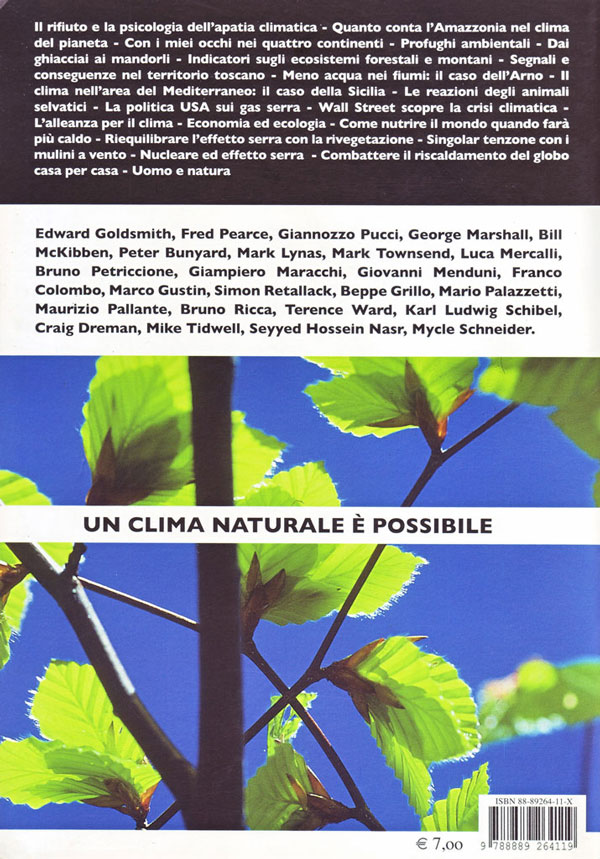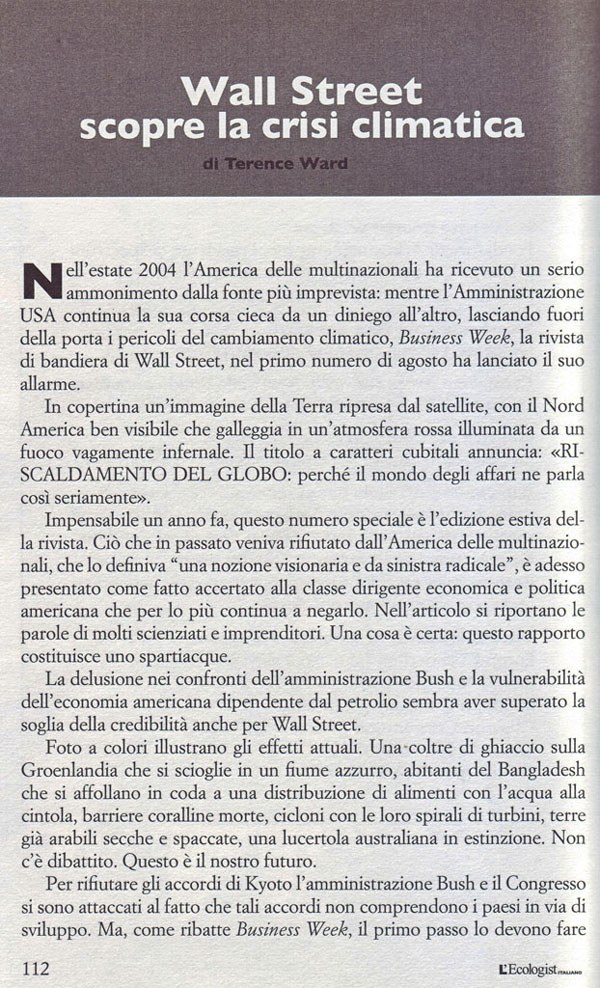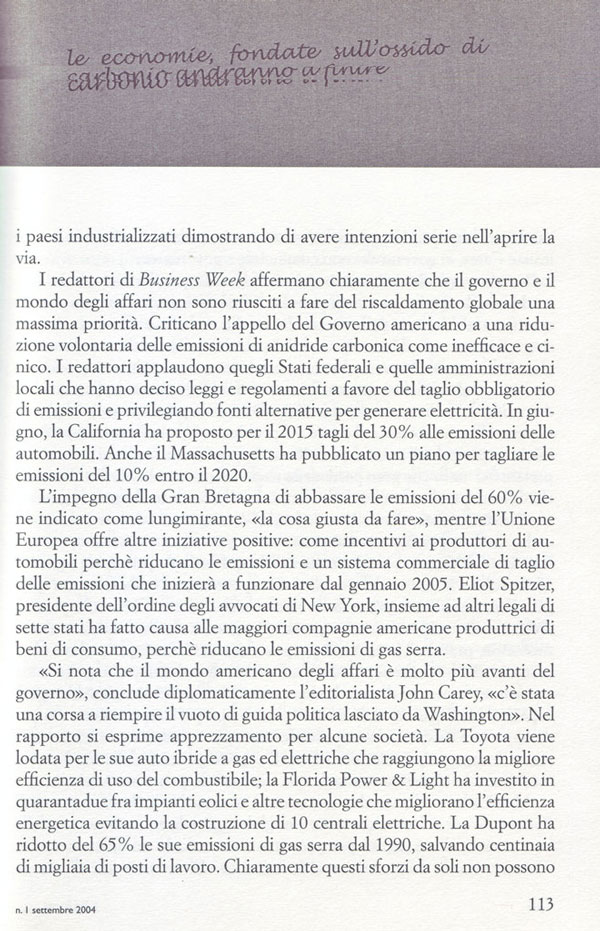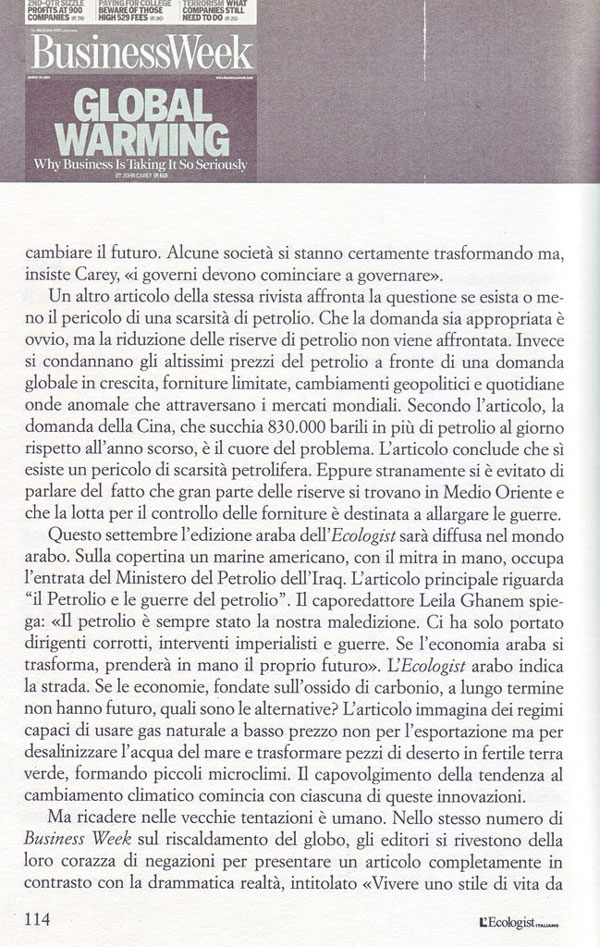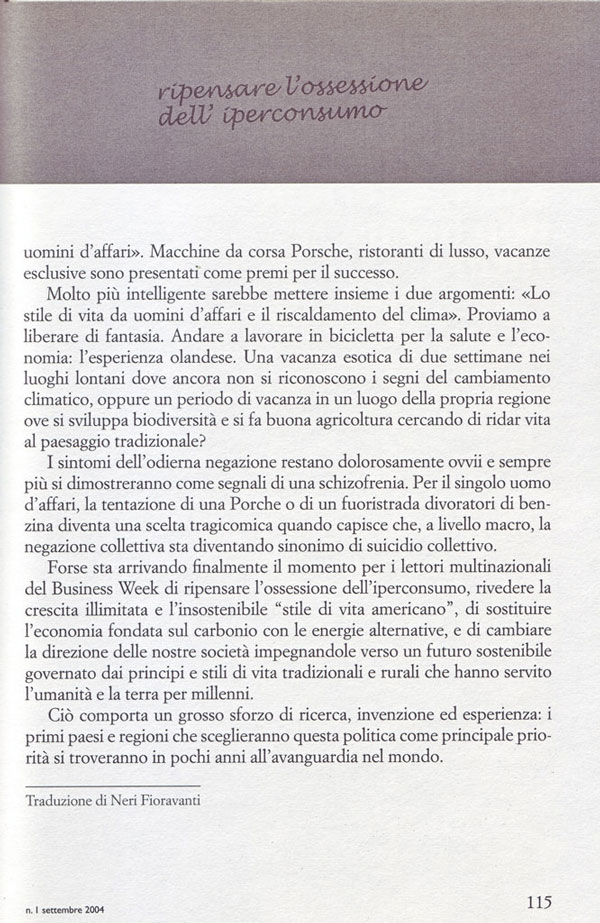In the summer of 2004, American multi-nationals received a shock from their most quoted source. While the US adminstration continues its blind refusal to speak of the dangers of climate change, Business Week, Wall Street’s leading journal, announced its alarm on the first of August.
On the cover an image of the earth taken from satellite, with a visible North America inflamed in a scarlet atmosphere of blazing fire that vaguely resembled Hell. The title with mammoth red letters announced, “Global Warming: Why Business is Taking It So Seriously.”
Unthinkable a year ago, this special issue addressed the taboo long rejected by multinationals as “a visionary notion or the radical left.” In the article, quotes are taken from leading scientists and entrepreneurs focusing on the dangers at hand. The commentary is presented as a certified fact to America’s business elite and the politicians who continue to negate it. There is no room to debate. It is here and the only smart thing to do is to plan and adapt.
The Bush administration’s inability to confront America’s dependence on petroleum has strained all credibility, even for Wall Street. The vulnerabilities are clear; the delusion is palpable.
Color photos illustrate the true effect. One huge block of the Greenland ice-sheet peels off into a blue river, Bengladeshis stand in line for food with water up to their waist, miles of dead coral reefs like a maritime graveyard, hurricane clouds spinning in wind spirals, once-arable land now dry and cracked, the torched Australian outback looking like a zone of extinction. There is no debate. This is our future.
By refusing to sign the Kyoto protocol, the Bush administration and Congress defend their position by saying that developing nations are not held accountable. But, according to Business Week, the first phase of accountability has to begin with the developed countries that must demonstrate their serious intention to lead the way.
The editors of Business Week clearly affirm that governments and the business world have not given global warming the maximum priority it deserves. They criticize the US government’s call for voluntary reductions of carbon dioxide emissions as cynical and inefficient. The editors applaud states and local administrations that have shown the courage to pass regulations pressing for obligatory cuts in emissions while creating incentives for alternative energy producers. In June, California proposed a cut of 30% of automobile emissions by 2015. Massachusetts also published a plan to cut emissions by 10% by 2010. Eliot Spitzer, attorney general for New York, joined other attorney generals from seven states to take legal action against major American companies to force a reduction of gas emissions.
The commitment of Great Britain to lower emissions by 60% indicates a vision of “the right thing to do,” while the European Union offers other positive initiatives: incentives for automobile producers to begin lowering emissions by January 2005.
“It’s clear that the American business elite are far ahead of the government,” concludes the editorialist John Cary. “It has been a conscious choice to take charge, as the political will has been abandoned by Washington.” These actions are each expressed differently by varying companies. Toyota launched its new hybrid car powered by gas and electricity that gives major efficiency with a combustible engine; Florida Power & Light has invested in 42 wind-powered plants which increase energy efficiency and also plan to construct 10 more electric plants. Dupont has reduced by 65% its gas emissions from 1990, saving hundreds of jobs. Clearly this force alone cannot change the future. “Each company may begin their own changes,” insists Carey, “but governments have to begin to govern.”
Another article in the same edition raises the subject of oil scarcity and the long-term viability of the fossil fuel economy. The depletion of global oil reserves is an obvious point. Instead of condemning the high price of oil, geopolitical changes give insight into growing global demand. According to the article, China’s consumption increased an additional 830.000 barrels of oil a day over last year. This reality lies at the heart of the problem. The article concludes that oil scarcity is a real and present danger. What is left unsaid is the glaring fact that the world’s major supplies remain situated in the volatile Middle East–and the struggle to control oil flow is destined to attract war.
This September, the Arabic Ecologist was published in the Arab World. On the cover was the photo of an American Marine, with his rifle in hand, guarding the entrance of the Iraqi Oil Ministry. The headline reads: “Oil and the War for Oil.” Editor Leila Ghanem explains: “Oil has always been our malediction. It has brought us only corrupt dictatorships and imperialist intervention. For the Arab economies to transform, they must seize their own future.”
The Arabic Ecologist shows the way. If an economy, founded on carbon energy, has no future over the long term, what are the alternatives? The article imagines regimes with using natural gas at the lowest price, not to export, but to desalinate sea-water and transform pieces of the desert into green fertile land, creating their own micro-climate. Combating climate change will need a host of similar innovative visions.
But then to succumb to old temptations is human. In this same Business Week dedicated to Global Warming, the editors countered the dramatic reality with an article entitled: “The Life-Style of a Master of the Universe”—featuring Porsche sports cars, luxurious restaurants, exclusive exotic vacations—a spectacle of success and its rewards.
Any intelligent readers would link together the two arguments together: “Life-styles of the Rich and Global Warming.” To liberate the fantasy, one only needs to look at the Dutch experience. Riding to work on bicycle for health and the economy. A two-week exotic vacation in a remote location that has not been affected by climate change or a trip to a region developing biodiversity with an enlightened agriculture giving life to a traditional landscape?
The symptom of blindness always is so painfully obvious that it becomes a sign of schizophrenia. For a businessman, the temptation of a Porsche or a gas-devouring SUV becomes a tragic-comic choice when one realizes that, at the macro level, this collective negation is becoming synonymous with collective suicide.
Perhaps finally the moment has arrived for all the corporate readers of Business Week to rethink their obsession of hyper-consumerism, to reexamine the unlimited growth, and look carefully at the unsustainable “American way of life.” Substituting an economy founded on carbon with alternative energy will change the direction of our society towards a sustainable future governed by principles and ways of life that have served humanity for millennia.
There needs to be a dramatic infusion of funds into research and innovation. The first country that chooses this new economy as its top priority will find itself in the enviable position as the most avant-garde nation on earth, and in its grasp with be the energy paradigm for the future.
by Terence Ward


